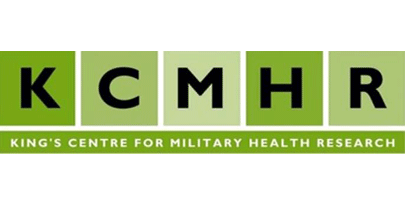Findings from the UK Veterans Family Study: Psychological health, wellbeing, and social support.
Background
Current estimates indicate 7.0% (1.75 million) of all households in England and Wales contain at least one person who has previously served in the UK Armed Forces. While our research has shown how Service life can impact, positively or negatively, on the health and wellbeing of Service personnel, veterans and their families, little is known about the experiences of families after leaving Service. What research has been undertaken has tended to focus on the partners of US veterans with PTSD, with very little on adult children of veterans.
To help address this gap, researchers at KCMHR and Queen’s University Belfast, along with colleagues from Combat Stress, Anglia Ruskin University, Glasgow Caledonian University, and Cardiff University/Veterans’ NHS Wales, came together to establish the UK Veterans Family Study (UKVFS). Funding was kindly provided by the Forces in Mind Trust (FiMT). The UKVFS aimed to:
- investigate the health and wellbeing of veterans, their partners, and their adult children across the four nations of the UK;
- identify factors that support or challenge veteran family health and wellbeing, and;
- examine current and future support needs, help-seeking, and barriers to care.
Findings from the final report
Today we released our final report from the UKVFS which examines the psychological health and wellbeing of veterans, their current/former partners, and their adult children using information from surveys (veterans (n=1,904), partners (n=475), and adult children (n=240)) and interviews (partners (n=37) and adult children (n=34)). Key findings include:
· Overall, most veteran families appeared to have good psychological health and wellbeing after military Service. While caution is needed given low numbers, a small number of veterans, their partners, and their adult children may need additional support with symptoms of post-traumatic stress disorder (PTSD), depression, anxiety, and alcohol misuse.
· Comparisons between nations found significantly higher rates of PTSD and loneliness among Welsh and Northern Irish veterans, higher rates of anxiety in Welsh veterans, and lower subjective wellbeing scores for veterans in Wales and Northern Ireland compared to veterans in England. No differences were found for partners or adult children by nation.
· Psychological ‘wellbeing’, perceived social support and satisfaction with this support were high across all cohorts but loneliness was also high.
· Participant descriptions of mental health within interviews focused largely on the impact of caring for a veteran with PTSD. Discussions of alcohol use in the interviews were almost entirely limited to in-Service experiences, with the military community seen as protective against substance use by young people.
· Some families reported issues with managing finances during Service which continued into post-Service life due to poor financial literacy. Financial issues were particularly pertinent when veterans were discharged unexpectedly, either for medical, administrative, disciplinary, or other reasons, as there often wasn’t time to plan or manage post-Service life.
· While some family members described experiencing challenges to daily family life due to military Service and transition, they also reported feeling like part of a community which provided social, emotional, and practical support both before and after transition from Service.
· Key risk factors for poorer psychosocial health and wellbeing among veteran families included: not being in a relationship, discharge from military Service for reasons other than end of Service contract, lower veteran rank on discharge and working in lower skilled civilian occupations.
· Factors associated with better psychological health and higher wellbeing included being older, doing well financially, and the veteran of the family having served in the RAF – this is possibly due to differences in education, income, and social class across different Service branches.
Our recommendations
Within the report, we make recommendations for research, policy, and practice. These include, but are not limited to:
· Consistent definitions of military and veteran family members within and across public services including the NHS.
· Development of alternative ways of identifying and connecting veteran families into services.
· A call for research, policy and services to move towards focusing on family member health and wellbeing in their own right rather than merely as a potential support for the veteran
Summary
These findings from the UKVFS provide the first overview of the psychological health and wellbeing of UK veterans and their family members. Overall, most veteran families appeared to have good psychological health and wellbeing after military Service. While caution must be applied to some findings due to small numbers, areas where the families of veterans may need additional support were identified - common mental disorders and loneliness, lower perceived social support, and probable PTSD and alcohol among adult children.
We hope that the findings provide useful guidance for ongoing research, policy, and practice in relation to support and understanding of the psychological health and wellbeing experiences of veteran families in the UK and open new avenues in these areas for the future. Further outputs are being prepared and will be shared via this webpage as they are published.
